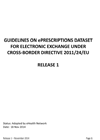 These guidelines respond to Article 11 (2-b) of the Directive, which defines the need for "guidelines supporting the Member States in developing the interoperability of ePrescriptions". They are intended to be complementary to Commission Implementing Directive 2012/52/EU of 20 December 2012 laying down measures to facilitate the validation of medical prescriptions issued in another Member State (Implementing Directive 2012/52/EU).
These guidelines respond to Article 11 (2-b) of the Directive, which defines the need for "guidelines supporting the Member States in developing the interoperability of ePrescriptions". They are intended to be complementary to Commission Implementing Directive 2012/52/EU of 20 December 2012 laying down measures to facilitate the validation of medical prescriptions issued in another Member State (Implementing Directive 2012/52/EU).
Member States have agreed to work jointly, through the eHealth Network established under Article 14 of Directive 2011/24/EU, on the interoperability of ePrescriptions in order to facilitate the implementation of Article 11 of Directive 2011/24/EU. Article 11 is entitled Recognition of prescriptions issued in another Member State.
The primary focus of these guidelines is to support the objective of cross-border electronic exchange of prescriptions. A secondary focus of the guidelines is to provide material for each Member State to use, if they wish, for reference at national level.
Download: Guidelines on ePrescriptions Dataset for Electronic Exchange under Cross-border Directive 2011/24/EU (.pdf, 1.245 KB).
Download from eHealthNews.eu: Guidelines on ePrescriptions Dataset for Electronic Exchange under Cross-border Directive 2011/24/EU (.pdf, 1.245 KB).